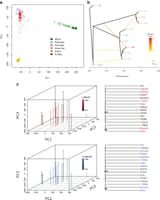>>515074842
>A whole-genome sequencing study of Turkish genetics, conducted on 16 individuals, concluded that the Turkish population forms a cluster with Southern European and Mediterranean populations and that the predicted contribution from ancestral East Asian populations is 21.7% (presumably reflecting a Central Asian origin). However, that does not provide a direct estimate of a migration rate, because of factors such as the unknown original contributing populations. Given Europeans and Native Americans may share Ancient North Eurasian ancestry, "significant Ancient North Eurasian ancestry might also be found in Turkish genetic profiles; this requires further study"
>Another study in 2021, which looked at whole-genomes and whole-exomes of 3,362 unrelated Turkish samples, resulted in establishing the first Turkish variome and found "extensive admixture between Balkan, Caucasus, Middle Eastern, and European populations" in line with history of Turkey. Moreover, significant number of rare genome and exome variants were unique to modern-day Turkish population. Neighbouring populations in East and West, and Tuscan people in Italy were closest to Turkish population in terms of genetic similarity
>Central Asian contribution to maternal, paternal, and autosomal genes were detected, consistent with the historical migration and expansion of Oghuz Turks from Central Asia. Central Asian autosomal DNA geneflow was estimated as around 10%. Using haplogroups that are only found in Central Asia, the study estimated Central Asian paternal and maternal contributions. Paternal contribution was estimated as between 8.5% to 15.6% based on C-RPS4Y and O3-M122 Y-chromosome haplogroups. Maternal contributions was estimated as around 8% based on D4c and G2a mtDNA haplogroups
